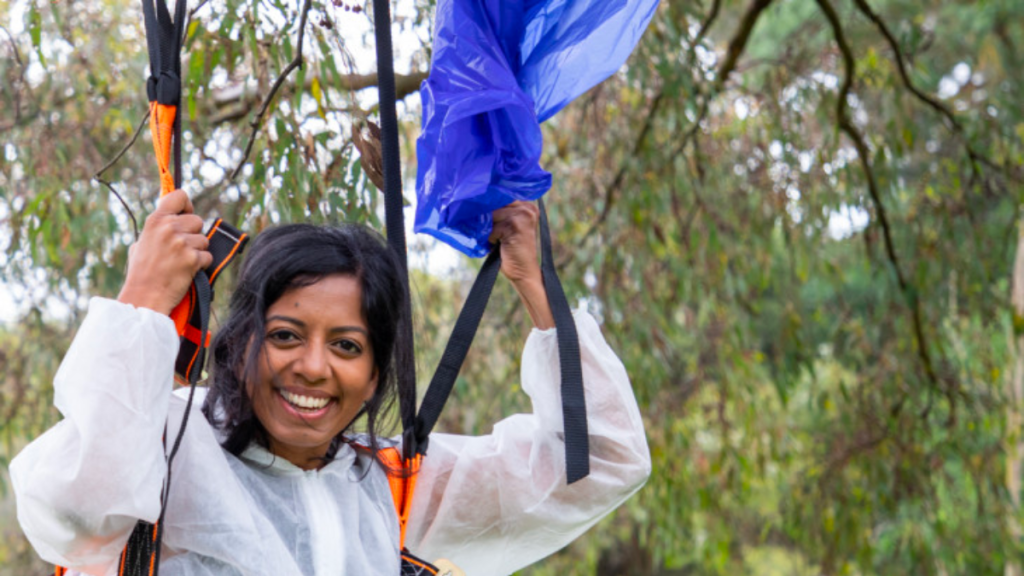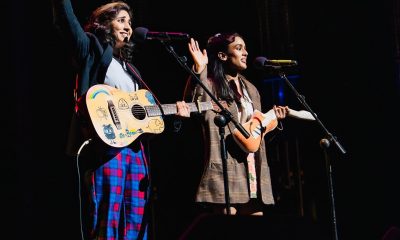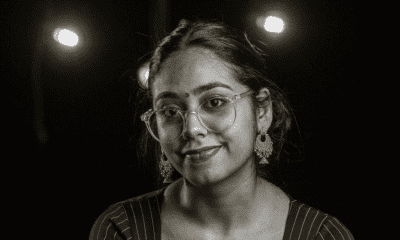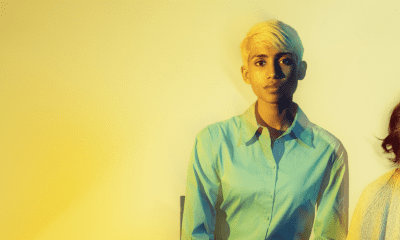Arts
‘It’s a Good Time To Be a Brown Woman’: Sri Lankan-Australian Comedian Sashi Perera On Her Debut Solo Show ‘Endings’, Backing Yourself, and Why Internet Trolls Should ‘Just Have A Maz’
In conversation with Sri Lankan-Australian comedian Sashi Perera.

It’s Tuesday night, and the Trades Hall is packed for Sashi Perera. We’re in the front row, dead centre, eyes locked with the Sri Lankan-Australian comedian, laughing as she pokes fun at life’s inevitable impermanence—its endings, its beginnings, and inevitably, its endings, again.
Sashi’s comedy isn’t always about tickling your ribs (although there is much of that in her debut solo show, Endings). Drawing on her former life as a refugee lawyer—with its many zigs and frequent zags—Sashi’s comedy also comments on the complexities of the human experience. Armed with sharp wit and incisive insights, she’ll invite you to confront your fears, your failures, and even, your mortality. And, well, she’ll also teach you that even if you get chlamydia twice and end a relationship three days out from the wedding, you’ll still sell out most of your shows at the Melbourne International Comedy Festival. Not bad, eh?
Even if the refugee-lawyer-turned-comedian has only recently leapfrogged into the limelight thanks to this thing called TikTok, there’s plenty to love about Sashi Perera. Her charm. Her wit. Her sweetness. Her smile. (If you haven’t heard of TikTok, that’s ok. They’ve probably heard you busting out a rendition of Bad Romance in the shower (which, in fact, is something that Sashi does in Endings)).
Brown Boy Magazine spoke to Sashi about her debut solo show, Endings, her path to comedy, and her approach to clobbering internet trolls. To those looking for a pep talk, Sashi says backing yourself is hard, but do it anyway. But to her trolls, she says have a maz and go for a walk. Even if you’re not a troll, have a maz, and go for a walk. Who doesn’t like having a maz in the sunshine, anyway? (Indoors, of course—don’t do something your mother wouldn’t do.)
Sashi Perera’s Endings is running at the Melbourne International Comedy Festival until 22 April 2023. Lucky for you, Sashi has added two extra shows on 21 April and 22 April 2023. If your wallet permits, support Sashi and other South Asian Australian comedians.
Brown Boy Magazine: Many Australians will be familiar with your comedy now, having performed extensively in Melbourne and your recent virality on social media. What can we expect from your new show, Endings?
Sashi Perera: I once changed careers, countries and partners at the same time. Only then did it really hit home how much we struggle to talk about endings—we focus on the excitement of beginnings and tend to see endings as a failure. They’re not! I hope to squash people’s fear of endings with this show. While making them laugh. Even if they laugh quietly. I’ve really loved writing this show, and so many of my dates at the Melbourne International Comedy Festival have sold out because of Instagram. It’s unbelievable. I’m so excited to meet everyone off screens and in real life!
BB: You’ve lived across the world, born in Sri Lanka and raised in the UAE, Oman and Australia, and you’ve since worked in several countries with organisations like the UNHCR. What inspired you to leave your career as a refugee lawyer and become a comedian? Has it influenced your comedy?
SP: I loved the analytical parts of the law and learning about people’s lives. But after a decade of working in a hectically under-resourced sector, I needed to laugh. Stand-up comedy lets me do that while keeping the analytics, connecting with people and being silly. It’s so hard to find ways to be acceptably silly as an adult. I’m so glad I stumbled on this one. I talk about anything I find funny—that may be race, it may be mandarins, or it may be shingles. It really just depends on the day. I love that anything can be funny.
BB: Since leaving the legal profession, you’ve written and performed extensively, and you were the only Australian to be recognised on the 2021 UK Funny Women Awards’ Ones to Watch List. What advice would you give other South Asian Australian writers and comedians considering a career change?
SP: Backing yourself is really scary. Do it anyway. I wanted to post reels for ages, but I hesitated because I thought—who on earth will care? I’m so glad I did it anyway! Get out of your own way and go do that thing you want to do. It doesn’t have to be all or nothing—I still have a day job because having stability allows me the freedom to be creative. It’ll take a while to figure out the balance that works for you—so quick, get started! If you’re still hesitating, DM me, and I’ll give you a pep talk.
BB: Your comedy often explores the topics of race and racism. And you’re no stranger to racism and trolling on social media. Your responses to the online trolls are hilarious. Have you experienced much racism since your rise to fame? How have you dealt with the negative comments (other than with grace and your ripper sense of humour)?
SP: I never use the word ‘racism’ or ‘race’—I make light of actual life experiences. Often, the people demanding why I’m still talking about colour or gender haven’t lived much weirdness as a result of their colour or gender. I joke about heaps of stuff—automated voices, self-serve checkouts, Tutankhamun—but the jokes that go viral are the ones about colour or gender because they resonate with the experiences of so many. You’d think that’d be a hard thing to discount—but here we are.
I‘m amazed that trolls bother to leave a negative comment. Wouldn’t it be much more pleasant to have a maz and go for a walk? I didn’t mean to start trolling them. It came so naturally—I should probably be worried about that! I focus on all the positive messages, and if I find myself upset at all, I put the phone down and do something fun. Like have a maz, and go for a walk.
BB: There are a few more South Asian faces on the comedy scene in Australia than there were a few years ago, but there’s still a long way to go. What more could we do to ensure that comedy is more diverse and inclusive?
SP: I think a lot has changed in comedy to encourage more diversity—many of my awesome opportunities in comedy came because it’s a good time to be a brown woman. There’s still a long way to go, but the amount of support I have around me in the community is heartening.
The unfortunate truth about online trolls is that they surface from their virtual troll bridges, no matter who you are. I hope the greater the spotlight on crummy behaviour, the greater the number of people who step in and demand change. It’s part of the reason that I screenshot the ridiculous comments, so people are aware of some of the trash out there.
Real change only happens when enough people demand it, and I really do believe that there are way more good people in the world than trash people. We just need the good ones to be a bit louder.
Brown Boy Magazine (@brownboyau) celebrates worship-worthy tastemakers and changemakers in the South Asian Australian diaspora (without taking itself too seriously).







